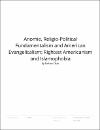Anomie Écrasant, Religiopolitical Fundamentalism and American Evangelicalism: The Advent of Rightest Americanism and Islamophobia
Abstract
This article explains how intensifying levels of Durkheim’s “anomie”—that is, the weakening of social bonds, social alienation and normlessness—lead to the development of a fundamentalist offshoot of American Evangelicalism termed “Rightest Americanism” and its virulent Islamophobia. To begin, it does so by arguing the anomic condition is not uniform, and a variety of intensities are possible. Consequently, Teymoori, Bastian and Jetten describe “high anomie” as containing high levels of disregulation and disintegration. Adding to that, Chak (2019) argues that at its most intense manifestation “anomie écrasant,” it includes value incoherence and moral ambivalence across social spheres leading to high levels of social frustration. Collectively, that intense anomic condition leads to a uniquely “conflicted” cultural milieu that cultivates religiopolitical fundamentalism. And, in the United States, this led to a vitriolic strain within Evangelicalism described as “Rightest Americanism,” which weaves together the return of Jesus Christ, the destruction of Al-Aqsa Mosque and Islamophobia into a violent, apocalyptic social imaginary. Not only that, it also advocates for World War III and the end of the world. Now, with the presidency of Donald Trump, there are legitimate concerns on how this dangerous ideology poses a danger to global peace.
Collections
- Gulf Studies [137 items ]


